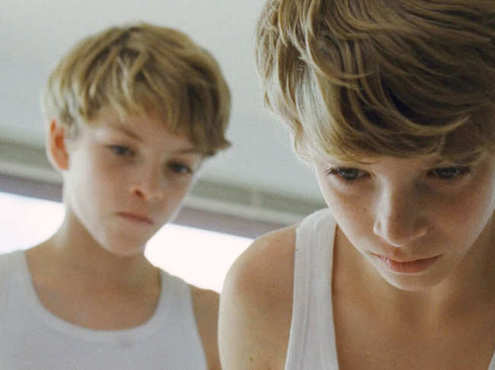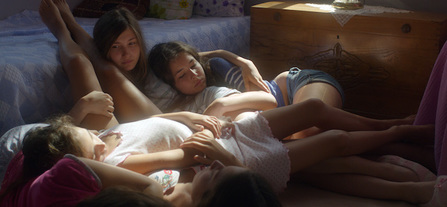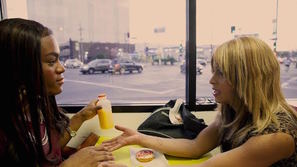The Zeitgeist in Film 2015

Four themes stood out in 2015:
Traditional families are in flux; sexual identity is fluid; women’s rights are under siege, and musical genius has a shadowy side.
Struggling Moms
The thrill of the Austrian film Goodnight Mommy was how it created a stillness that got under the skin like a primal nightmare. The mother of twin boys comes home, her face in covered in bandages from plastic surgery. Her strange behavior embodies the worst fears and nightmares of childhood; the film’s graceful beginning turns memorably grisly.
In M. Night Shyamalan’s The Visit it is the grandparents who are acting weird. Mom leaves the kids for a week to go off with her boyfriend and it’s over the river and through the woods to grandmother’s (and grandfather’s) house the young ones go. Childhood is about navigating the unknown; this film has all the elements of a satisfying fairy tale.
The mother in the Room (Brie Larson) is raising her son in an underground bunker simply called Room, where the boy (a remarkable Jacob Tremblay) was fathered by the woman’s abductor. Irish director Lenny Abrahamson takes the disturbing premise of Emma Donoghue’s book and screenplay and comes up with a suspenseful drama about the power of a mother’s love in the face of incredible challenges, both psychological and sociological. The occasional moments of schmaltz are redeemed by the movie’s noteworthy performances.
In I Smiled Back, Sara Silverman plays Laney Brooks, a mother with a dependency on cocaine and alcohol who is steeped in self-loathing. The film is heavy on aberrant behavior and short on cause or reason, but this unabashed depiction of middle-class suburban addiction provides a useful moral lesson to a culture dedicated to self-interest and self-medication.
Traditional families are in flux; sexual identity is fluid; women’s rights are under siege, and musical genius has a shadowy side.
Struggling Moms
The thrill of the Austrian film Goodnight Mommy was how it created a stillness that got under the skin like a primal nightmare. The mother of twin boys comes home, her face in covered in bandages from plastic surgery. Her strange behavior embodies the worst fears and nightmares of childhood; the film’s graceful beginning turns memorably grisly.
In M. Night Shyamalan’s The Visit it is the grandparents who are acting weird. Mom leaves the kids for a week to go off with her boyfriend and it’s over the river and through the woods to grandmother’s (and grandfather’s) house the young ones go. Childhood is about navigating the unknown; this film has all the elements of a satisfying fairy tale.
The mother in the Room (Brie Larson) is raising her son in an underground bunker simply called Room, where the boy (a remarkable Jacob Tremblay) was fathered by the woman’s abductor. Irish director Lenny Abrahamson takes the disturbing premise of Emma Donoghue’s book and screenplay and comes up with a suspenseful drama about the power of a mother’s love in the face of incredible challenges, both psychological and sociological. The occasional moments of schmaltz are redeemed by the movie’s noteworthy performances.
In I Smiled Back, Sara Silverman plays Laney Brooks, a mother with a dependency on cocaine and alcohol who is steeped in self-loathing. The film is heavy on aberrant behavior and short on cause or reason, but this unabashed depiction of middle-class suburban addiction provides a useful moral lesson to a culture dedicated to self-interest and self-medication.

Women Fight Back
Stories about women’s rights made for some of the year’s best films.
Never has a divorce proceeding been as comical and absurd, obscene and frustrating, as the conflict in the Israeli film Gett: The Trial Of Viviane Amsalem, a riveting and wonderfully acted courtroom drama. According to Jewish religious law, a wife must obtain a “gett’ (full consent) from her husband in order to obtain a divorce. Vivian’s passive-aggressive husband exemplifies the absurd iniquity of this patriarchal set-up for the perpetuation of legal tangling.
French director Céline Sciamma follows up her award-winning film Tomboy with Girlhood, a look at black teens in the projects of a Paris suburb. The film is less about race than about the power of friendship and the universal dreams felt by girls who are coming of age in less than ideal circumstances. The movie features a remarkable cast of non-professional actors.
The Diary of a Teenage Girl, cleverly adapted from the graphic/prose novel of the same name, features British actress Beth Powley, who is utterly convincing as a highly sexed adolescent who indulges in some very questionable behaviors. The character is saved from the dark side by her gift for drawing and storytelling. Based on life of its author, Phoebe Gloeckner, this is what real female liberation looks like today.
Todd Haynes’ erotic and stylish melodrama Carol is an adaptation of Patricia Highsmith’s ‘gay’ novel The Price of Salt. By examining social and personal conflicts of identity in the Eisenhower era, Haynes is clearly putting a critical lens on inequities regarding sexual orientation in America today. Cate Blanchett and Rooney Mara are subtly brilliant.
The French and Turkish production Mustang is the dark tale of five lovely sisters orphaned by their father and now being raised by their uncle. Because the women are seen playing with boys, their guardian decides he should cloister them away from erotic temptation and marry them off as soon as possible. This marvelous film, which revolves around what the director calls “the constant and hideous sexualization of women,” turns out to be liberating and hopeful.
Stories about women’s rights made for some of the year’s best films.
Never has a divorce proceeding been as comical and absurd, obscene and frustrating, as the conflict in the Israeli film Gett: The Trial Of Viviane Amsalem, a riveting and wonderfully acted courtroom drama. According to Jewish religious law, a wife must obtain a “gett’ (full consent) from her husband in order to obtain a divorce. Vivian’s passive-aggressive husband exemplifies the absurd iniquity of this patriarchal set-up for the perpetuation of legal tangling.
French director Céline Sciamma follows up her award-winning film Tomboy with Girlhood, a look at black teens in the projects of a Paris suburb. The film is less about race than about the power of friendship and the universal dreams felt by girls who are coming of age in less than ideal circumstances. The movie features a remarkable cast of non-professional actors.
The Diary of a Teenage Girl, cleverly adapted from the graphic/prose novel of the same name, features British actress Beth Powley, who is utterly convincing as a highly sexed adolescent who indulges in some very questionable behaviors. The character is saved from the dark side by her gift for drawing and storytelling. Based on life of its author, Phoebe Gloeckner, this is what real female liberation looks like today.
Todd Haynes’ erotic and stylish melodrama Carol is an adaptation of Patricia Highsmith’s ‘gay’ novel The Price of Salt. By examining social and personal conflicts of identity in the Eisenhower era, Haynes is clearly putting a critical lens on inequities regarding sexual orientation in America today. Cate Blanchett and Rooney Mara are subtly brilliant.
The French and Turkish production Mustang is the dark tale of five lovely sisters orphaned by their father and now being raised by their uncle. Because the women are seen playing with boys, their guardian decides he should cloister them away from erotic temptation and marry them off as soon as possible. This marvelous film, which revolves around what the director calls “the constant and hideous sexualization of women,” turns out to be liberating and hopeful.

Transgender Stories
Transgender stories and performances have come a long way since Ed Wood’s Glen or Glenda in 1953. Jeffrey Tambour as Maura Pfefferman in the Amazon series Transparent is, like the series itself, honest and heartfelt.
Tangerine is colorful and tawdry; it features transgendered actors Kitana Kiki Rodriguez and Mya Taylor as prostitutes in the underbelly of Los Angeles on Christmas Eve. Shot entirely with cell phones, the film is filled with garish colors that match its protagonist’s garish behavior. This is world about which many of us know very little.
In The Danish Girl, Eddie Redmayne gives a flawless performance based on a real life figure, Einar Wegener, a woman trapped in a man’s body. After overcoming formidable obstacles, he became the first recipient of sexual reassignment in 1931. Alicia Vickander is also excellent as Wegener’s artist wife. It is a sympathetic and romanticized depiction of the trials and tribulations of of Wegener, who later painted under the name Lili Elbe.
Transgender stories and performances have come a long way since Ed Wood’s Glen or Glenda in 1953. Jeffrey Tambour as Maura Pfefferman in the Amazon series Transparent is, like the series itself, honest and heartfelt.
Tangerine is colorful and tawdry; it features transgendered actors Kitana Kiki Rodriguez and Mya Taylor as prostitutes in the underbelly of Los Angeles on Christmas Eve. Shot entirely with cell phones, the film is filled with garish colors that match its protagonist’s garish behavior. This is world about which many of us know very little.
In The Danish Girl, Eddie Redmayne gives a flawless performance based on a real life figure, Einar Wegener, a woman trapped in a man’s body. After overcoming formidable obstacles, he became the first recipient of sexual reassignment in 1931. Alicia Vickander is also excellent as Wegener’s artist wife. It is a sympathetic and romanticized depiction of the trials and tribulations of of Wegener, who later painted under the name Lili Elbe.
